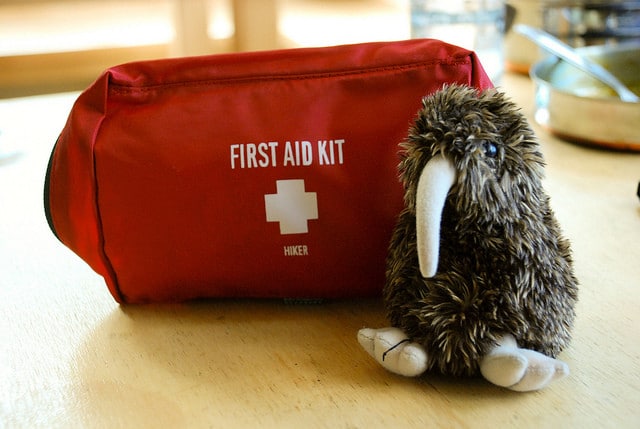Travel insurance admittedly isn’t the most interesting realm of travel talk, making it subject to hearsay, rumors, and massive gray areas. All perpetuated due to a lack of discussion and by the insurance companies and travelers alike. Sure, getting travel insurance is easy, but finding out what’s covered and how to use it isn’t quite a clear cut and often full of disappointing surprises if you’re not prepared.

You might be asking what happens if your laptop is stolen or you break a leg in Qatar – to more grave situations like needing to go home or have someone make medical decisions for you.
Do I Need Travel Insurance?
There are two extremes in opinion when it comes to travel insurance from ‘never travel without it’ to ‘it’s a waste of money’. Usually those opinions are formed by people who’ve either had the need to use travel insurance, know someone close to them who has, or has been traveling for years without an incident. The truth is most people’s insurance needs fall somewhere in between. It’s an important question to ask, especially for longer trips, and should you get travel insurance is a topic I’ve covered in dept previously worth a gander.

Is Travel Insurance A Scam?
Insurance companies don’t exactly have the best reputations and the world of travel insurance tends to be murkier waters in general. There are, however, many legitimate travel insurance companies who offer short term coverage, extended travel plans, and those for expats permanently living abroad. The big names floating around are World Nomads, IMG, TravelEx, and HTH Worldwide comes recommended by fellow vagabond Sherry Ott.

How Much Does Travel Insurance Cost?
The answer to this question varies widely. In addition to the usual health insurance variables (age, drug requirements, etc.) travel insurance depends much upon which country you’re a resident of, where you’re going, and for how long. Generally speaking though, for a middle-aged single male or female, costs range from about $100-350 per month traveling to and from a range of countries.

You can compare travel insurance rates on sites like InsureMyTrip, call the travel insurance companies directly for lower quotes, and use tactics from The Art Of War to get the best price.
 What Isn’t Covered?
What Isn’t Covered?
I can’t stress enough how important it is to read the fine print of any insurance policy as they vary quite a bit – generally speaking for routine travel insurance the following are NOT covered: preexisting medical conditions, prescription drugs, pets traveling with you (though there are policies that cover them), sexually transmitted diseases, and anything you do while drunk or high. Don’t get pregnant either. Also, every single policy has wording against you being stupid; be sure to check the exact definition.
Insurance companies also tend to try and make unpredictable events seem expected, wiggling their way out of reimbursement; usually they give you a 3 day window after calamity to cancel a trip. (Here’s how to decide just when to cancel travel plans.)
- What about electronics? Most companies cover cap claims between $500-2,500.
How Do You Actually Use Travel Insurance And File A Claim?
Typically you send an email, use an online submission form, or for more serious or involved claims make a phone call. You need to keep all of your receipts, doctor notes, and anything else that can prove what you’re claiming to the travel insurance company. This process can go smoothly but usually requires a bit of verbal jiu-jitsu so the more paperwork you accumulate the better. Knowing the details of your policy helps as well; you should use the fine print to adjust your terminology accordingly.

- I don’t mean that to say file a false claim, just make sure you use the best wording for your situation to get the most out of your coverage. Also, don’t volunteer information, let the insurance company do the asking and make your claim as soon after the incident as possible.
 How About Getting Killed, Being Unconscious, Or Angry Bird Attacks?
How About Getting Killed, Being Unconscious, Or Angry Bird Attacks?
Having spent a few hours on hold with various travel insurance companies I found out these basics for when things really go wrong or an ostrich pokes your eye out. (Again, it all varies. I’m just a guy on the Internet. Read and confirm each specific policy!) Basically, travel insurance acts as a secondary insurance to your existing coverage if you have health care back at home. Travel insurance covers the emergency abroad (hospital costs, etc.) and will usually get you back home if the doctors determine you need extensive care.
In the case you’re killed or unconscious for any length of time (hopefully not of course) the information on you is used to contact anyone they can find. Some allow you to designate an emergency contact but the general rule of thumb is to carry a policy print out clearly identifying at least the phone number and name of your insurance company back home. Also, don’t get close to ostriches.
The Details Are In The Devil
Most travel insurance companies post the details of their policies on their websites though often there are gray areas for your particular travel situation. The phone (or via Skype) is the best way to get the details you need. Stick with it, get names, and jot down policy numbers for the things you’ve learned in case you end up having to use them down the…or on the road.
[top photo by: Kathrin & Stephan (kiwi first aid), snejb (question mark), guntzooki (con artist), Images_Of_Money (pictures of currency), EdWohlfahrt (bottle of pills), Peter Prodoehl (telephone), dtaylorcreative (ostrich)]












great points! I’ve contemplated getting travelers insurance before, but always cheap out at the last minute- I’ve been told that for shorter term trips sometimes your credit card insurance can cover major accidents, but I’ve never looked into it. Will definitely look up some the next time I’m gone for more than a month.
Even on shorter trips it might be worth it, depending on where you go, the electronics you carry with you, and your medical coverage. Check your credit card, chances are at least *part* of your trips are already covered somehow.
Thanks for the overview Anil. I’d like to flag that costs for people who are not US citizens (and have free healthcare in their home countries) are much, much lower than the figures you cite. My travel insurance for a year travelling worldwide with my son came in at under $400, and I think figures are similar for other EU citizens, not to mention Aussies. You can get basic cover for a year as a British citizen for about what it appears to cost a US citizen for one month.
True, it is much lower for those with free health care at home; I used a variety of countries to come up with the average (e.g Turkey, India, Brazil and several others) – the US and many non-western European countries pushed the figures higher.
Glad you pointed this out though, certainly a great deal for those in the countries you mentioned – excellent incentive to get travel insurance if travelers from those countries are on the fence 🙂
Well, if nothing is covered when I’m drunk – what’s the point?? 🙂
LOL!
Whenever we travel to the USA (we’re from Europe), we ALWAYS get travel and health insurance. You don’t need a high IQ to figure out why. We are quite aware what can not be claimed and just really have it for the major incidents. We are strong proponents of getting travel insurance because the very first time we did get one, a parent died a few days before our departure. 90% of our costs were reimbursed by our insurance.
Thanks for sharing Michael, any particular insurance company you go with?
Let’s hope the birds don’t attack you on your next trip!!
This is a touch topic for sure. Some other things to be aware of is where your home country is and what the rules are there for credible continuous coverage. In America – continuous coverage is important. Plus – do consider that if you go on a trip and you come back with a parasite – you might not get covered in your home country after your trip is over since it’s a preexisting condition. Lots of nuances. My best advice it talk to a specialist who really knows insurance in your country, get educated – then go out and research options.
Interesting point about the parasites actually – reading through the fine print is so tedious, it’s easy to get tripped up. Wish basic things like insurance and taxes didn’t require the help of professionals to be understood…
haha “every single policy has wording against you being stupid; be sure to check the exact definition.”
and what if i’m too stupid to remember to read it? just kidding. thanks for the informative post. i avoided this but i actually learned something.
That’s what the insurance companies count on, that we’re too
stupidlazy to read the fine print 🙂If you ask me, people saying “it’s a waste of time” are complete idiots…here are some things you just can’t predict or avoid. I’ve been traveling abroad for about 5 years now, nothing happened to me so far (hope I keep it this way), but I still get my insurance when I leave the country.
Every travel situation and traveler is different but not having to use it doesn’t mean it’s not good to have. A lot like health insurance 🙂
Great post as travel insurance is an essential part of traveling.
Couple of other pointers:
– understand the activities that are covered. A number of policies EXCLUDE various adventure activities that are considered “normal” on a backpacking trip such as parachuting or even skiing (skiing is a tricky one as most policies exclude “off piste skiing”)
– you get what you pay for. Check the actual value of the cover, rather than the cost of the insurance. A $1 a day policy may cover a minor accident, but the costs of evacuation and major trauma – sorry, you’ve hit your limit.
– know where you’re traveling as you can save significant costs if you exclude North America from your policy
Very good advice Kim, thank you – especially the first point which I think many people may not know or think to check about.
What if you can’t affird the initial medical and you are sick in a foreign place?
Do you mean if you don’t have insurance?